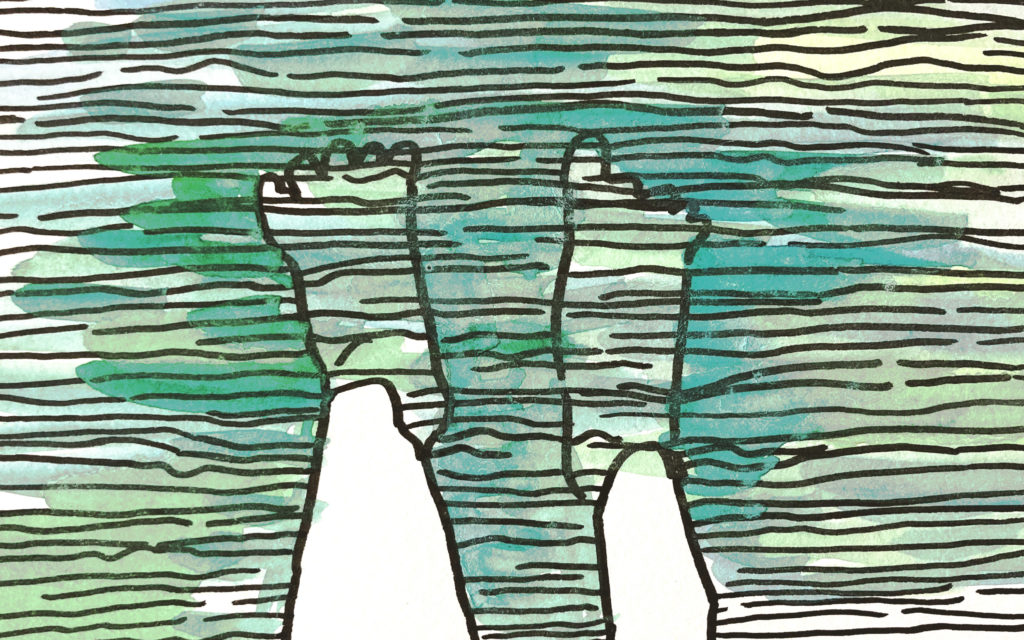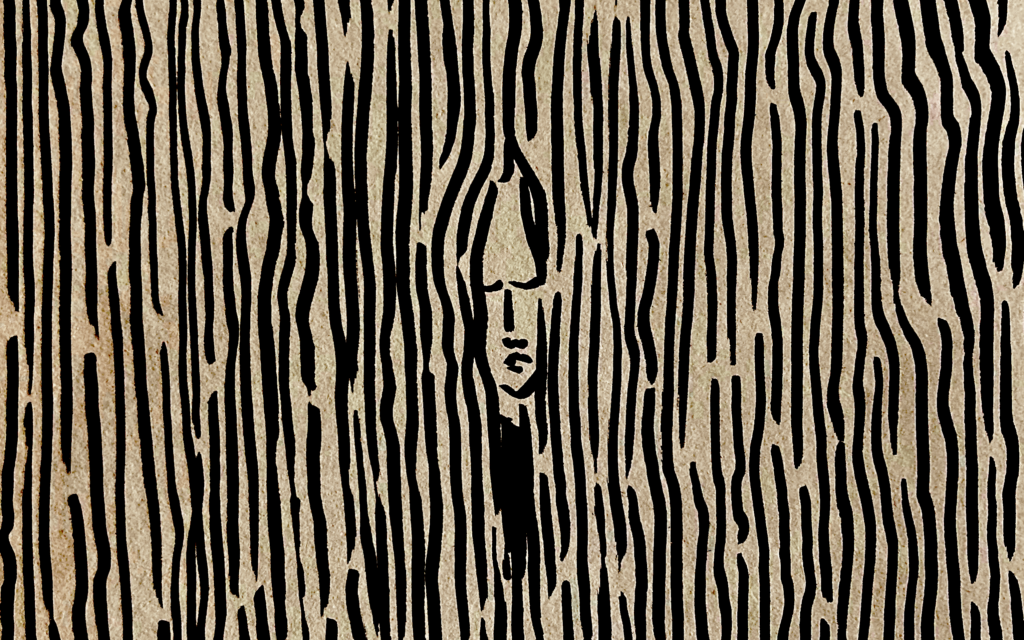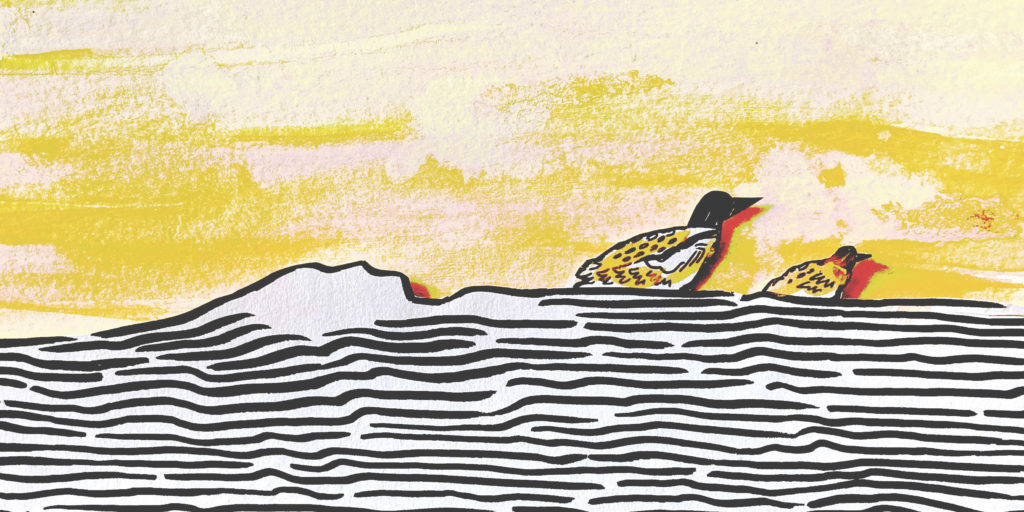There were two loons in our still bay. They were quiet during the day when the sun sat behind the gloomy clouds with the humidity perspiring downwards to our armpits and hairlines. But at night, when the cool air blew through the leaves and pine needles, the loons sang to each other. Their calls were wilderness sirens. We sat on our deck many feet above them and could hear them as if they were five feet from us, as if we could touch them. Sometimes we could make them out when the tree line turned blue as sunlight smoldered behind the tall trees, evincing a serene soberness. The pair was often on opposite sides of the bay, and after one called out to the other they silently cut through the water as if it were air itself, speeding towards each other.
In high school, I wanted to leave the small town I grew up in and become somebody. I wanted to be a city person. I wanted to be around people and places. I imagined things to do always around the corner, lights and traffic never stopping, and constant music playing. I thought I was better than the people who stayed in our town of 10,000 people, who were comfortable with the stability of steady consistency, of no excitement. I wanted to find a big city I could creatively excel in. I could become a writer, an author, and a musician: I wanted to find an identity I had always dreamt of.
Instead, I enrolled at a college four and a half hours away from my town. It was a college in a town of 5,000 people, set in the middle of a vastness of farmland and pastures of crops and cows. It was a town smaller than my hometown. I traveled the county highways in my 1990 Buick Lesabre with the windows down on an August day because the air conditioning was broken. For the ride, I rarely exceeded 65 miles an hour, and sweat pooled at the small of my back that was pressed to the light blue fabric seat behind me. I sweated the entire drive.
A new experience and a new adventure diminished any sense of loss or sadness at leaving a world behind me. But I couldn’t help thinking about the migrating loons that would also leave the world I had already left for warmer weather. Loons have been clocked flying at speeds more than seventy miles per hour. I imagined the pair of loons from my bay above the road I was traveling: when I veered west they continued south, probably thinking that the little black Buick Lesabre beneath them was going the wrong way.
My college town lacked lakes and thus was loonless. On a particularly warm afternoon, my roommates and I traveled to a lake a few towns over. We sat on the sandy beach with books we never opened while we talked about our classes and the crushes we already had, quickly formed by a little smile or a brief meeting of glances. I stood up and went to the public bathrooms, passing by an older woman who was painting a watercolor of the lake. I asked her if there were any loons in the lake. She looked at me blankly. She said she wished there was so she could include them in her art.
When I put my feet in the lukewarm water, slimy greenish grime-covered my feet. Loons need crystal clear water in order to see their food underneath them. I walked further into the water, up to my knees, and the weeds six feet down were imperceptible. I only knew they were there because one was sticking up above the surface. The opaque water clouded the inability for any creature to see through it. I wondered if I had chosen the right place to spend the next four years of my life.

The summer after my junior year I decided to stay in my college town instead of going back home. I worked for the Admissions Office as an office assistant: giving touring in the sweltering heat to come back to the office in the cool conditioning and enter data while listening to Spotify. After work, I went back to the five-bedroom house where I lived by myself and ate a no carb diner. A few hours later, during my favorite time of the night, right before dusk, I would go for runs on the bike trails out by the two windmills high above anything else in sight. I always ran without headphones at night. I listened to the buzzing, chirping, and silence while my feet padded the tar over and over. It either smelled like manure or the compost pile where our green college composted food and compostable items, back behind the baseball field, back behind the cow pasture, back behind the sustainability building.
I went north on the weekends, often leaving work early to travel to my other home: my parent’s home. College is a weird time where the word home gets blended into two locations. Because both are home, especially after trekking back and forth for a few years. One is a home away from home, college, with friends and fun and intellectual stimulation while the other (for me) was a safe home, a familiar home where family conversations sometimes frustrated but were always filled with love. It hit me then, that the loons in our bay felt the same. While I always considered our bay down from our house their rightful home, it wasn’t. They had two homes. Ours was the home where they heard a Minnesotan drawl in gazebos, canoes, fishing boats, and wooden cabins from children playing games at dusk, from parents drinking on the lake, from grandparents passing cards for rummy or bridge.
The loon’s southern home, from somewhere along the coast of North Carolina to Florida or the Gulf of Mexico was their native element — the place where they frequented for longer bouts of time. I’ve been to Florida before, and while it’s warm and nice, my bones feel stuck to Minnesota, tightened to the trees and lakes that have convinced me there’s no place like it. More and more people have been following the paths of the loons — like snowbirds, they migrate south for the winters and come to relish the land of the lakes during its bloom.
Graduate school allowed for more venturing, more random destinations. While I worked on my master’s at a limited residency program I flew East once a semester (twice a year) to try and get a step closer to attaining my dream of becoming somebody. Our last residency was held in New York, where we stayed at a fancy hotel, met literary agents, conversed with editors, listened to lectures with passion, and slept extraordinarily from exhaustion.
In this city, where I got a tattoo at midnight on a Wednesday night, where Central Park was larger than I imagined, where the lights never turned off, where I went to a jazz club with two co-students, where garbage trucks picked up Christmas trees at three in the morning, where the noises were nonstop and disruptive until they became regular, I ached for one sound only: the sirens of the loons.

During my limited residency, I lived, during all the weeks of the year not in a different city, in my hometown. I was back where I started. Instead of feeling ashamed, which I had thought would happen, I earnestly eased back into the sounds I had been aching for.
It became clear to me that I was someone all along. I was a person who wanted to listen to the loons at nighttime, in a small cabin or house, with a solely lit lamp, with mosquitos buzzing in a swamp nearby, surrounded by people I could call family. I was a person who craved routines, patterns, and the simplicities of the visible components around me.
Loons’ bones are solid, unlike other birds, so they can dive deeper into the water, quicker, they can sink deep into the waters they excel in. It seemed to me my bones had an affinity to the home I thought I had so badly wanted to abandon. Why do we always want to leave the things that nurture, educate, and care for us?
For all the years I pictured myself in a new city, being someone I wasn’t, I never completed the vision. Time and time again I could have left the town with a rare store open past nine in the evening on a weekday, the town with an older population, with less job opportunities in my field, and even the town that my immediate family members eventually departed.
I sit at the end of the metal dock with my feet in the cool water and hear the loons calling to one another. The trees whistle and whish in the wind, frogs croak, the water laps again and again on the shore from the baby waves, and the sun slips behind the horizon across the lake like it’s running away from the moon. I close my eyes and tilt my head back.
They’re quiet tonight. A storm went through yesterday creating a chill in the water that wasn’t there two days ago from the August heat. I picture the red-eyed birds searching the waters beneath them for hidden fish, cutting through the waters like little bullets.
Steady and sure, the loons dive again and again through the freshwater like they come back year after year to Pickerel Bay. Loons are common where I’m from, many lakes have multiple pairs, hunting and homing. The loons here though are more than noteworthy. After 22 years of eavesdropping on their signals I realized that they were the reason my bones were heavy and sure that I was home.
My mind had never left the sirens of the loons. •




